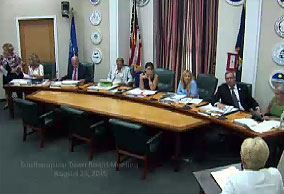 Hamptonites are still in shock at Southampton conceding defeat Aug. 25 after a five-year battle with the East End Eruv Assn. against erection of an eruv Jewish religious boundary. SH lost the “sign” issue but is now abandoning its argument that eruvim violate the rule against church/state entanglement.
Hamptonites are still in shock at Southampton conceding defeat Aug. 25 after a five-year battle with the East End Eruv Assn. against erection of an eruv Jewish religious boundary. SH lost the “sign” issue but is now abandoning its argument that eruvim violate the rule against church/state entanglement.
The SH board voted unanimously in the last few seconds of a 49-minute meeting not to appeal the June 30 decision by State Supreme Court Justice Joseph Franeti who ruled that since the “lechi” markers proposed for SH utility poles are “virtually invisible,” they are not “signs” and are thus not violations of SH’s sign laws.
Supervisor Anna Throne-Holst said a deal with EEEA would grant it the right to place markers on utility poles in return for a promise not to pursue legal costs and penalties against SH. EEEA has asked to see the agreement in writing. This website has made a similar request to SH officials.
Opponents of eruvim said such markers are visible on Synagogue and Google websites and the sites explain in detail what they mean—the conversion of public land into the “private domain” of the believers.
|
|
The story in the Aug. 27 Southampton Press reported that the board voted the eruv pullback as a “walk-on” resolution that was not on the agenda, meaning the public had no advance notice of such a proposed decision.
Left out of the story were details such as the resolution was the 38th and last one to be taken up and that there was no discussion by the trustees or citizens. It came in the last 31 seconds of a 49-minute meeting “and if you sneezed you would have missed it,” said one citizen who viewed the Mediatraq videotape.
The SH Press is in favor of eruvim, calling them “invisible” in an editorial July 23. The Aug. 27 story by reporter Kyle Campbell was his last for SHP since he is joining the Daily News as a digital content producer for its auto section in Jersey City.
Citizen Groups, Press Mostly Silent
The decision by the SH trustees has mostly been met with silence by media such as the New York Times, Newsday, News12longisland.com (30 news staffers), the patch.com, local news service, Dan’s Papers, The Independent of East Hampton (Jerry Della Femina), eastendbeacon.com and citizens of the Hamptons.
The [Jewish Daily] Forward said Aug. 26 that the decision of the SH board will allow expansion of the WHB eruv to Westhampton, which is unincorporated, and Quogue.
A lively email debate is taking place following the story posted Aug. 27 by Campbell. Eleven of the postings can be termed “anti-eruv” and the rest, “pro-eruv.” The anti-eruv writers say eruvim violate the bar against church/state entanglement. Pro-eruv writers say lechis are no different than real estate signs, St. Patrick's Day signs and Feast of Gennaro signs.
|
|
“ShelleyB” writes that since observant Jews know where the boundaries are (as shown on websites), “why are lechis needed? Do the Jewish police arrest you if you go outside the boundaries? But if they’re only thin strips on telephone poles is it really hurting anyone?”
Media, Libraries Disappoint Anti-Eruvers
Anti-eruvers were plotting strategy this week in the face of the latest defeat.
They feel that not only are the courts politicized on this issue but also the media, libraries, national and local political leaders, most of the real estate industry, and nearby universities such as Stony Brook and Touro. Last New York Times article on the eruv battle in the Hamptons was on Feb. 4, 2013. “Mr. Sniev” of Dan’s Papers is predicting zooming home prices in the Hamptons if eruvim get established,.
They note that Throne-Holst has cited the eruv battle as a financial burden on SH. Outside legal costs so far have been about $700,000 but this is on a budget of $80 million, citizens note.
A burden on Throne-Holst would be campaigning against Rep. Lee Zelden, the only Jewish member of the House of Representatives, while fighting an eruv in the Hamptons. She is seeking his seat in the 2016 election.
Libraries Take a Pass
Local libraries, supposedly dedicated to education and learning, have mostly refused to take up the eruv issue.
|
|
An exception is the Rogers Memorial Library of SH, which agreed to keep on file legal decisions related to the battle supplied by the O'Dwyer Co. It would not stock O’Dwyer stories and editorials on the issue. No library will host a discussion on the topic.
Rogers, unlike libraries in Westhampton, Quogue and Hampton Bays, is a “public” library that lets the public elect its trustees. It is “dedicated to inspire and serve the educational, cultural and lifelong learning needs of the Southampton and Tuckahoe school districts.”
Victoria Kahn, owner of the Hamptons Virtual Office Center and Agawam Town & Village Realty, was elected to a three-year term Aug. 7 by citizens of Southampton.
She is a graduate architect of the University of California Berkeley, received an M.B.A. in finance from New York University and has a Masters in French Civilization from the University of Paris Sorbonne. She joins Sandra Klemuk, president, and trustees Robert Gerbereux, Susan Johnson, David Campbell, Patricia Fincchiaro, Alexandra Halsey-Storch and Judith Johnson. There is one vacancy after Frances Burns and Glenn Halsey decided not to seek re-election.
The library adopted a $4,019,733 budget based on a tax levy of $4,351,401.
Libraries in WHB, Quogue and Hampton Bays are “association” libraries that do not hold public elections of board members. They are 501/c/3 non-profits that file Form 990 returns to the IRS.





 Husch Blackwell Strategies has added FleishmanHillard alum Michael Slatin as a principal in its public affairs group.
Husch Blackwell Strategies has added FleishmanHillard alum Michael Slatin as a principal in its public affairs group. Rory Cooper, a veteran Republican operative and policy specialist, has joined Teneo’s Washington office as senior managing director in its strategy & communications practice.
Rory Cooper, a veteran Republican operative and policy specialist, has joined Teneo’s Washington office as senior managing director in its strategy & communications practice. Brian Fallon, who served as national press secretary for Hillary Clinton’s 2016 presidential run, is signing on next month as Vice President’s Kamala Harris’ campaign communications director.
Brian Fallon, who served as national press secretary for Hillary Clinton’s 2016 presidential run, is signing on next month as Vice President’s Kamala Harris’ campaign communications director. TikTok is nothing more than a Chinese propaganda tool that poses “a grave threat to America’s national security and, in particular, impressionable children and young adults,” say two Congressmen who want the platform registered as a foreign agent.
TikTok is nothing more than a Chinese propaganda tool that poses “a grave threat to America’s national security and, in particular, impressionable children and young adults,” say two Congressmen who want the platform registered as a foreign agent. Public Strategies Washington has added Abbie Sorrendino, a former aide to now Senate Majority Leader Chuck Schumer.
Public Strategies Washington has added Abbie Sorrendino, a former aide to now Senate Majority Leader Chuck Schumer.


 Have a comment? Send it to
Have a comment? Send it to 
No comments have been submitted for this story yet.